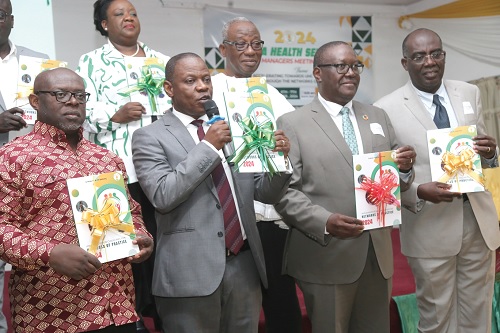
GHS launches strategy to strengthen primary healthcare delivery
The Ghana Health Service (GHS) has launched a new strategy to strengthen primary healthcare delivery that includes guidelines for implementation.
Advertisement
The rollout of the Network of Practice follows a successful pilot in some parts of the country.
The model is in the form of a hub and spokes where the former, a district hospital, is connected administratively and clinically to a group of public, private and faith-based health facilities to offer holistic essential healthcare services.
The spokes, the connected health facilities, include infirmaries, maternity homes, laboratories, sickbays, pharmacies and community-based health and planning services compounds (CHPS).
The district hospital is also linked to regional hospitals for advanced care.
Event
The Director-General of the GHS, Dr Patrick Kuma-Aboagye, launched the initiative at a senior managers meeting (SMM) of the service in Accra yesterday, on the theme: “Accelerating towards universal health coverage with a strengthened primary health care (PHC) through the network of practice.”
Present at the meeting were key stakeholders and development partners in the health delivery sector.
Objectives
Dr Kuma-Aboagye said the network of practice was one of the country’s strategies to achieve universal health coverage by 2030.
Other Trending Stories
He said the overall goal of the strategy was to increase access to quality health care and population-based services for all by 2030 in line with core values such as equity, quality care, strengthened referral systems and community engagement, among others.
Dr Kuma-Aboagye said the relationship between the hub and spokes would accelerate distribution of healthcare services across the network, thereby enabling the health needs of the people to be addressed within their respective localities.
He said the meeting formed part of the wider process of assessing the performance of the health sector and determining priority issues to feed into their annual planning, as well as provide direction for senior managers on interventions.
“The SMM primarily aims at helping us catch up on priority policy and operational issues that came up following last year’s meeting (SMM I).
“As a catch-up SMM, we have carefully chosen a theme to re-echo the burning need for improved stakeholder commitment and engagement towards increased access to quality essential health care and population-based services for all by 2030.
“Consequently, the theme unifies the agenda across programmes, partners and stakeholders in our forward march towards UHC,” Dr Kuma-Aboagye added.
He said the GHS was primarily focused on providing accessible, equitable and affordable healthcare services for all citizens, especially the poor and vulnerable in line with its mandate.
Significance
The Dean of the School of Public Health, University of Ghana, Prof. Kwesi Torpey, said the successful pilot of the initiative showed that it was key to achieving UHC to enhance access, quality and affordable health care.
He described the new model as the most consequential initiative in the sector after CHPS which would build a resilient healthcare sector founded on primary health care.
Prof. Torpey added that while the model had been proven to be effective, the national implementation would only be successful if implemented well with effective monitoring.
The Development Partner’s Lead and Country Representative of the World Health Organisation, Prof. Francis Kasolo, also said that the initiative reinforced the commitment of the health sector to identify innovative approaches to increase access to quality essential health care and population-based services for all.
“Ghana's Primary Health Care (PHC) strategy remains the bedrock of our approach to achieving UHC with a focus on improving health outcomes,” he said.
Writer’s email [email protected]
Advertisement




